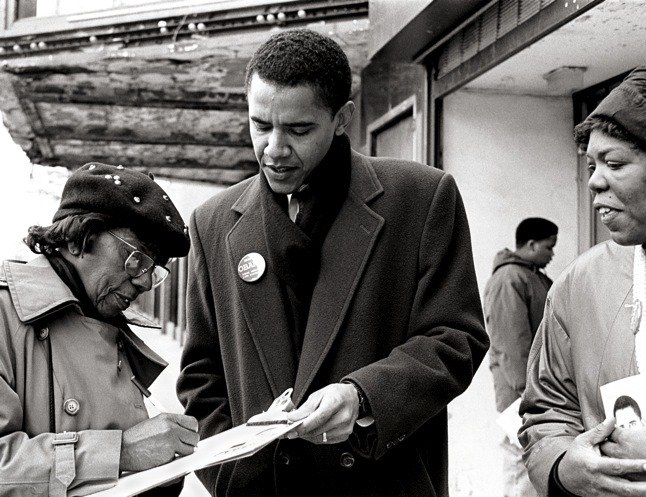
By many accounts, Democratic Illinois state senator Alice Palmer, an African American educator and politician, was good at her job. She represented the 13th district, a diverse constituency that encompassed the poorer Chicago’s South Side neighborhoods from Hyde Park to the South Shore and from the wealthier neighborhoods of lakefront west to the Chicago Lawn.
Palmer was also ambitious. Working her way up from a teaching position at a Chicago community college, she earned a Ph.D. from Northwestern in Education Administration and worked hard to increase educational opportunities for African American youth in Chicago. When long-time State Senator of the 13th district, Robert J. Newhouse Jr., retired in June 1991, she found herself appointed to his position. The next year, she ran for state Senate election and won, outlasting her Democratic and Republican opponents.
In 1994, fortune seemed to smile on Palmer again when U.S. Representative of the 2nd congressional district, Mel Reynolds, was indicted for statutory rape, opening up an opportunity to rise to the U.S. Congress through a special election. As she announced her campaign in 1995, she offered to support Jesse Jackson Jr., son of renowned civil rights activist, in the election for her 13th district seat. Her belief was that the old guard should pave the way for the new guard. But Jackson Jr. refused her support, instead opting to run against her in the race for the U.S. House of Representatives. However, Palmer was still feeling confident, so she threw her support for the 13th district behind a young, skinny lawyer with a funny name.
They called him Barack Obama.
Obama was a hungry upstart. He worked as a community organizer in Chicago’s South Side before attend Harvard Law School, eventually becoming the first African American president of the prestigious Harvard Law Review. He returned to Chicago to work in civil rights law, while also lecturing at the University of Chicago and leading voter registration drives for the 1992 elections. Palmer introduced and endorsed Obama when he announced his candidacy. He had worked hard to get to this point, and he felt grateful for the support he received.
Unfortunately, just as things were looking up for Obama, they began to trend downwards for Palmer. Jesse Jackson Jr.’s name recognition made him a popular choice. As the polls began to foreshadow the results, Palmer became nervous. What was once a clear opportunity had suddenly become muddled. On November 28, 1995, Alice Palmer finished a distant third in the race for the House of Representatives. She was disappointed, but still motivated.
So she began to explore her options and reached out to Obama’s campaign. Although she had initially stated that she would not seek re-election in the Illinois state senate election, she decided to re-enter the race for the 13th district just a few weeks before the special election. Even more, as the elder statesman, she wanted Obama to withdraw from the race. In a behind-the-scenes meeting, she asserted herself as someone who had put in more time, and therefore deserved the opportunity. Your time will come, she said to him.
Obama was conflicted. He had been preparing for this moment his whole life. The opportunity to throw his hat into the ring, to make a name for himself. He had seen countless others do it before him. His campaign had spent months gathering almost five times the number of signatures required to get his name on the ballot. What would it mean for his political career if he withdrew from the first race he ever entered? But on the other hand, Palmer had put in more time, and she was well-known in the district. Even more, she encouraged him to run int he first place. If he backed down, she would probably return the favor at later and give him another endorsement, right?
But Obama’s ambition, like that of any great man, could not be bottled once it was released. He had made enormous effort, sacrificing time with his family and his law practice, to get to this point. He had made a deal with Palmer and she had no right to renege on it. So Obama refused to back down. He would no longer wait for his turn because the next chance was not guaranteed.
And in an effort to grab the election by the jugular, his team looked into the signatures that Palmer collected in the final weeks before the election, as well as that of his other opponents. They discovered that close to a half of all the signatures were fraudulent. So they challenged the petitions and every single candidate was disqualified. So Obama ran unopposed, winning the Illinois state senate seat of the 13th district.
The rest, as they say, is history.
Ray Kroc, the founder of McDonald’s Corp, once stated:
“The two most important requirements for major success are: first, being in the right place at the right time, and second, doing something about it.”
When was the last time you saw an opportunity, only to balk and tell yourself that you weren’t ready? Or that the time was not right. I just need to get through these next two weeks, you said to yourself, and then I’ll have time to work on that app, or that screenplay, or that research project. And then you stalled and waited for the weeks to pass. Slowly, the idea faded and you told yourself the it was never fully developed enough or wasn’t that important anyway.
Guess what? There will never be the right time or the perfect time. The moment to make the move is right now. If you have done your due diligence, if you have worked hard, crossed your t’s and dotted your i’s then you have nothing to fear. Because somewhere, some upstart has the exact same idea as you and they are working twice as hard as you. So get serious. Get motivated. And get after it. No one else has any plans of backing down.
References